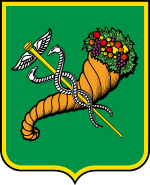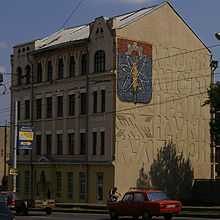Coat of arms of Kharkiv
| Coat of arms of Kharkiv | |
|---|---|
 | |
| Versions | |
|
Coat of arms of Kharkiv Oblast | |
| Details | |
| Armiger | Kharkiv |
| Adopted | 14 September 1995 |
The Coat of arms of Kharkiv is the official coat of arms of both Kharkiv city and Kharkiv Oblast.
History
The oldest arms of the city, known from the early 17th century, showed a bow and arrow. These arms, of unknown meaning or origin, were used until 1781. On September 21, 1781, the city was granted new arms, showing a horn of plenty (cornucopia) and a staff of Mercury, symbols for agriculture and trade.
On July 5, 1878 the arms were replaced. The new arms showed a horse-head, symbol for the famous stud farms in the city, with in the chief two coins and a star (see above). The coins symbolised trade and wealth, the star the new university. These arms were, at the request of the nobility, replaced by the old 1781 arms again on May 21, 1887.

The arms with the staff and cornucopia remained in use until 1918. During Soviet times the city had no official arms until December 26, 1968. The new arms were a typical example of Soviet heraldry, showing a wheel for industry, an atom for knowledge and a wheat-ear for agriculture, as well as the name of the city.
Finally, on September 14, 1995, the city council adopted the arms from 1878 again as the new city arms.
-

The first Kharkiv coat of arms.
-

Coat of Arms of Kharkov 1781.
-

The soviet coat of arms of Kharkov (1968-1995).
-

An unofficial version of the Soviet coat of arms.
Description
The coat of arms consists of a verdant shield with gold trim. A caduceus and a cornucopia are crossed on it. The caduceus symbolises good health, while the cornucopia, also called the "horn of plenty", emphasises an abundance of food. The shield is wreathed with golden oak leaves tied with a blue ribbon. The upper half of a sprocket is visible above the shield, symbolising industry. Four stalks of rye, two on either side of the sprocket, symbolise agriculture. The sprocket is surmounted by an open book with an atomic symbol, symbolising education and science.
External links
- A website on Ukrainian heraldry
- Another website with description of the Kharkiv coat of arms
- Coat of arms of KHARKIV (Ukraine)
| |||||||||||||||||||||||||
